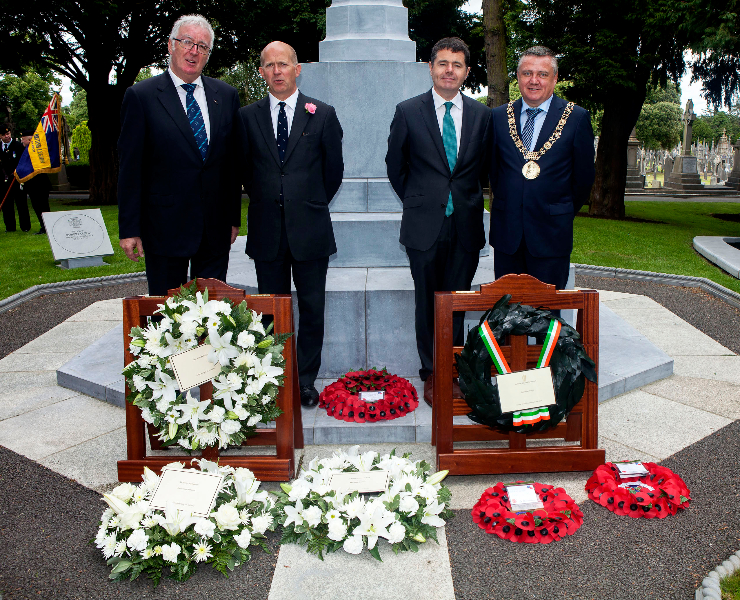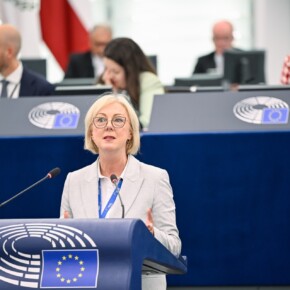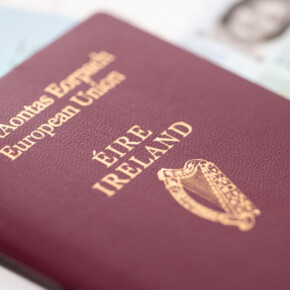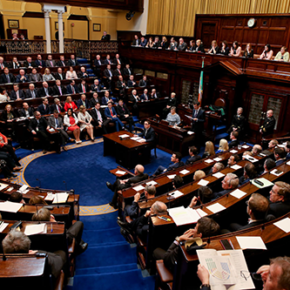Irish war heroes honoured in Glasnevin ceremony
Dublin People 12 Aug 2016
FOUR Victoria Cross memorial stones have been unveiled in Glasnevin Cemetery in memory of four Irish recipients who served in the Battle of the Somme and the Battle of Jutland.
The Minister for Public Expenditure and Reform, Paschal Donohoe; Dominick Chilcott, the British Ambassador to Ireland and Chairman of the Glasnevin Trust, John Green, led proceedings at the Victoria Cross commemorative stone unveiling.
The event was followed by a wreath laying ceremony at the Commonwealth War Graves Commission Commemorative Screen Walls and the Cross of Sacrifice to remember the thousands of Irish men and women who died fighting in World War One.
The Victoria Cross commemorative stones were unveiled in honour of Edward Bingham of HMS Nestor, Eric Bell, Royal Inniskilling Fusiliers, William McFadzean, Royal Irish Rifles, and Robert Quigg, Royal Irish Rifles.
Minister Donohoe said: “I am honoured to be here to mark this very special event.
“The stones that are being unveiled today, and the wreath that is being laid, pay tribute to those who, in many cases, paid the ultimate price of war. It gives me great pleasure to be joined today by, among others, Ambassador Chilcott as a mark of the historical journey our two countries have been on and the positive road that lies ahead.”
Chairman of the Glasnevin Trust, Mr Green added: “The Cross of Sacrifice under which we have unveiled the Victoria Cross stones and laid these commemorative wreaths this afternoon is a lasting tribute to the Irish men and women who fought in World War 1 and the enormous sacrifices they made.”
Edward Bingham, the son of Lord Clanmorris, led his division in their first atatck on enemy destroyers and then on the battle cruisers of the German High Seas Fleet during the Battle of Jutland.
For his actions, Bingham earned the Victoria Cross, one of the relatively few awarded for naval bravery during World War I.
Robert Quigg was awarded the Victoria Cross after Lieutenant Harry Macnaughten, the platoon commander was missing in the opening days of the bloody Battle of the Somme.
Quigg volunteered to go out into “no man’s land” to try to locate him.
After seven hours of trying, exhaustion got the better of him and he had to give up, but not before pulling other soldiers to safety.
Eric Bell was 20-years-old, and a temporary captain in the 9th Battalion, The Royal Inniskilling Fusiliers during the First World War.
He was awarded the VC for his actions on the first day of the Battle of the Somme on July 1, 1916, at Thiepval, France, which led to his death.
William McFadzean was a 20-year-old rifleman in the 14th Battalion, The Royal Irish Rifles, British Army during the First World War.
On 1 July, 1916, during the Battle of the Somme near Thiepval Wood, France, a box of hand grenades slipped into a crowded trench.
Two of the safety pins in the grenades were dislodged. McFadzean threw himself on top of the grenades, which exploded, killing him, but injuring only one other.











